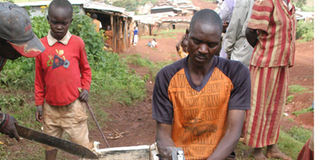2,000 to be allocated land as stalled work at Mt Elgon scheme resumes

FILE | NATION
Residents of Kipsigon trading centre in Chebyuk Settlement Scheme, Mount Elgon District, watch as Mr Bernard Kibwai makes a coffin. This was after seven people were shot dead in the area by raiders following clashes between two clans, the Soy and Ndorobo, over allocation of land in the area. More than 2,000 squatters are set to be allocated land in Phase Three of the settlement scheme.
More than 2,000 squatters are to be allocated land in phase three of the controversial Chebyuk Settlement Scheme in Mount Elgon.
The chairman of the taskforce overseeing resettlement in the scheme, Mr Solomon Ouko, said each squatter would receive 2.5 acres.
Speaking in Kitale at the weekend after holding a meeting with members of his team, Mr Ouko, a former deputy provincial commissioner, said 2,084 people had been vetted.
He said physical planning had been completed and surveyors were demarcating plots to be parcelled out.
Mr Ouko appealed to would-be beneficiaries and their leaders to be patient, saying about 80 per cent of the work on the land had been completed.
He said surveyors had gone on strike for more than three months to protest over unpaid allowances but had resumed work.
The chairman confirmed that the government had released funds to jump-start the stalled work at the scheme, which had stayed for long without a permanent solution.
Mr Harry Kimtai, a parliamentary aspirant, said that the stalling of the resettlement programme had caused panic in the area at a time it was healing from the Sabaot Land Defence Forces (SLDF) attacks.
The government sent the army to the area to stop the SLDF from unleashing terror on innocent residents in the area.
The politician regretted that the taskforce was behind schedule since its terms of reference indicated that the committee was supposed to complete its work within 90 days, which elapsed last year.
More than 2,000 displaced people, who have been living in tents with some hosted by relatives had been promised that they would be settled by the end of last year.
However, by the end of the year, the government had not completed resettlement on the 5,000-acre farm.
Human rights activist Eliud Tendet and Mr John Chemiat, an internally displaced person, who lives in a tent and is a beneficiary of the phase, said the programme was taking too long.
Mr Tendet complained that for the last three years, the government had set up a number of taskforces to oversee resettlement of squatters on the disputed farm.
One of the taskforces was headed by former provincial commissioner Joseph Kaguthi and its term expired early last year without concluding the job due to financial hiccups.
Mr Tendet threatened to rally would-be beneficiaries to invade the land in the next two weeks if the taskforce does not stick to its time frame.
Leaders in the district have presented a memorandum to the taskforce recommending that a leader, Mr Jason Psongoywo, 80, who was cleared of murder charges after the SLDF activities, be given 200 acres he earlier occupied before the government evicted people.
The memorandum, signed by the area MP, Mr Fred Kapondi, former county council chairman Benson Chesikak, Sabaot Council of Elders, professionals and clerics, among others, recommends Mr Psongoywo be given special treatment to avoid curses and further problems at the scheme.
They also asked the government to accept the boundaries drawn by the loibons (spiritual leaders) in the district, which are blamed for frequent violence.
The spiritual leaders have been fighting for supremacy.
Those leading the Soy and Ndorobo clans in fighting over land in the scheme had agreed on Terem River as the boundary dividing it.




